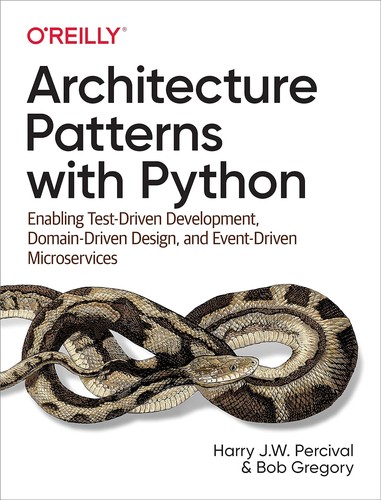Architecture Patterns with Python - Info and Reading Options
Enabling Test-Driven Development, Domain-Driven Design, and Event-Driven Microservices
By Harry J.W. Percival and Bob Gregory

"Architecture Patterns with Python" is published by O’Reilly Media in June 3, 2020 and the language of the book is English.
“Architecture Patterns with Python” Metadata:
- Title: ➤ Architecture Patterns with Python
- Authors: Harry J.W. PercivalBob Gregory
- Language: English
- Publisher: O’Reilly Media
- Publish Date: June 3, 2020
“Architecture Patterns with Python” Subjects and Themes:
- Subjects: ➤ python - test-driven development - domain-driven design - event-driven architecture - microservices - CQRS - dependency injection
Edition Specifications:
- Format: Web Book
Edition Identifiers:
- The Open Library ID: OL53716656M - OL21661812W
AI-generated Review of “Architecture Patterns with Python”:
"Architecture Patterns with Python" Description:
The Open Library:
Description A pragmatic guide to mastering architectural patterns in Python for building maintainable, testable, and scalable applications. This book systematically introduces Test‑Driven Development (TDD), Domain‑Driven Design (DDD), and event‑driven architectures through a single example application, built incrementally across chapters. It adapts common enterprise architecture patterns—like repository layers, unit of work, message buses, and CQRS—for Pythonic use, combining theory with working code. About the Book The authors, software engineers at MADE.com, show how to use classic software architecture ideas (more commonly applied in Java and C#) in the Python ecosystem. The entire book builds out a single app step-by-step, using tools like Flask, SQLAlchemy, PyTest, Docker, and Redis. Each chapter alternates between writing tests first and then implementing the logic to make the tests pass. This strict TDD approach helps readers deeply understand abstractions like message buses and aggregates in a hands-on, repeatable way. Topics & Themes Part 1: Domain modeling, repository pattern, unit of work, aggregates Part 2: Event-driven architecture, domain events, message bus, command handlers, CQRS, dependency injection Audience Intended for intermediate Python developers working on complex applications who want to improve their architectural design skills. The book is especially useful for developers transitioning from monolithic apps to microservices or looking to enforce better boundaries and testability in their code. Critical Reception Widely praised in the Python and architecture communities. Described on Hacker News as a “goldmine for architecture patterns.” Some caution against over-engineering for smaller projects, but overall the book is valued for bringing enterprise design clarity into the Python world. It’s also featured and recommended by respected voices like the Testing Goat blog for its strong emphasis on testing strategy. Why It Matters As Python finds greater adoption in large-scale, enterprise contexts, there's increasing need for structured approaches to architecture. This book provides practical, proven techniques—adapted to Python’s strengths and weaknesses—for building reliable systems that scale. This description was created by AI.
Read “Architecture Patterns with Python”:
Read “Architecture Patterns with Python” by choosing from the options below.
Search for “Architecture Patterns with Python” downloads:
Visit our Downloads Search page to see if downloads are available.
Find “Architecture Patterns with Python” in Libraries Near You:
Read or borrow “Architecture Patterns with Python” from your local library.
- The WorldCat Libraries Catalog: Find a copy of “Architecture Patterns with Python” at a library near you.
Buy “Architecture Patterns with Python” online:
Shop for “Architecture Patterns with Python” on popular online marketplaces.
- Ebay: New and used books.